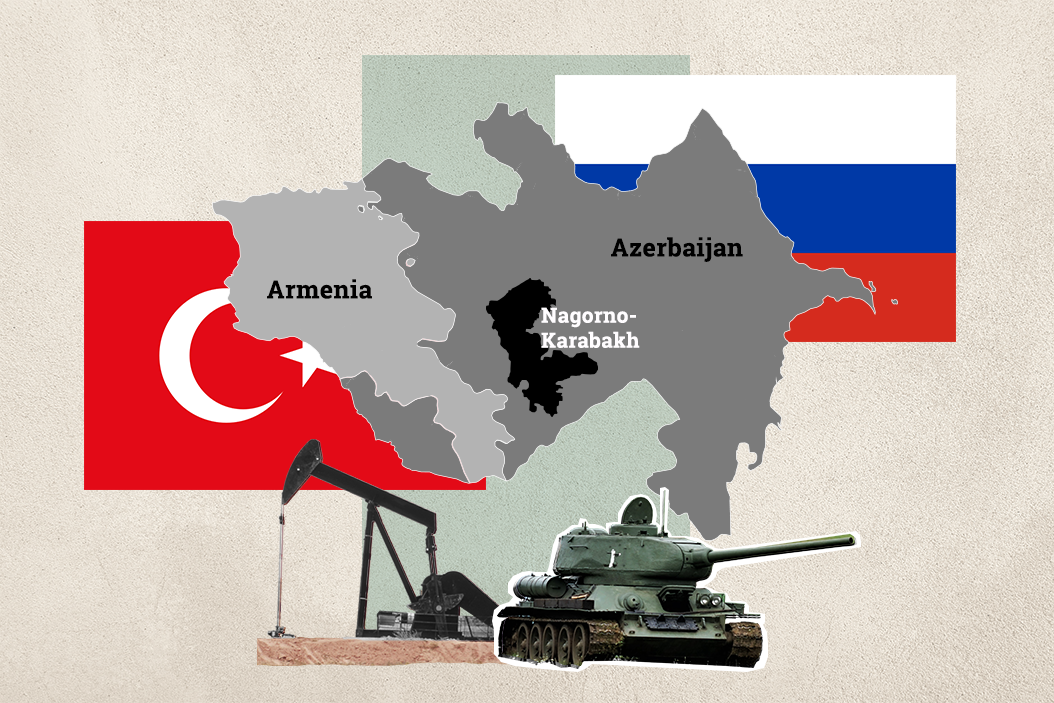September 28, 2020
The long-simmering conflict between Armenia and Azerbaijan over a region called Nagorno-Karabakh erupted over the weekend, with more than 50 killed (so far) in the fiercest fighting in years. Will it escalate into an all-out war that threatens regional stability and drags in major outside players?
What's the background? For years, Armenia and Azerbaijan have been at odds over the rugged highlands of Nagorno-Karabakh. In the dying days of the USSR, the two sides fought a bloody six-year war to control the enclave, which was part of Muslim-majority Azerbaijan but mainly populated by ethnic Armenian Christians.
The conflict ended in 1994 with over 30,000 dead, more than one million displaced, and a fragile truce that left Nagorno-Karabakh as a de facto independent state, supported by Armenia but not recognized by other countries, including Azerbaijan. Low-level clashes have persisted ever since — including deadly skirmishes in 2016 — and both governments often use the conflict to stoke nationalist flames at home.
Although the trigger for the latest violence is still unclear, bilateral tensions have been rising since mid-July, when 16 soldiers died in border clashes. That violence sparked an uproar in Azerbaijan, where thousands of Azeris took to the streets calling for the army to "recapture" Nagorno-Karabakh. Now, both sides are accusing each other of throwing the first punch, and have declared martial law.
A war over the enclave would resonate far beyond the region. The South Caucasus, where Armenia and Azerbaijan are located, has enormous strategic importance because it is crossed by two major energy pipelines that carry Azeri oil and Caspian Sea gas to Turkey and Europe.
Two outside players — Turkey and Russia — are on opposite sides of the conflict. Turkey has close relations with fellow Turkic Azerbaijan, and historically there is little love lost between Ankara and the Armenians. Moreover, Azerbaijan is Turkey's main oil supplier. Turkey has denied reports that it has sent 4,000 Syrians to fight on behalf of the Azeri army, but Turkish President Recep Erdogan's moves here merit close attention.
Russia is the dominant player in the region. But although it sells weapons to both Azerbaijan and Armenia, Moscow keeps troops garrisoned in Armenia and is, technically, treaty-bound to defend the country. If things escalate further, Vladimir Putin will have to decide whether to honor that obligation. Doing so could quickly put Ankara and Moscow on opposite sides of another nasty war (they already back different sides of the civil war in Libya.)
Finally, Iran also has a stake. It borders both countries, and Azeris are Iran's largest ethnic minority. Although Tehran has traditionally backed Yerevan, and often bickers with Baku over energy and security in the Caspian Sea, the Iranians offered to mediate when the latest tensions began two months ago. Will they try again now?
More For You
- YouTube
For many in Iran, it’s a waiting game for how long Ayatollah Khamenei has left to live.
Most Popular
An army soldier stands guard at a post at the Friendship Gate, following exchanges of fire between Pakistan and Afghanistan forces, at the border crossing between the two countries in Chaman, Pakistan February 27, 2026. Picture taken with a mobile phone.
REUTERS/Abdul Khaliq Achakzai
In a 30-minute call on Thursday, President Donald Trump reportedly told Ukrainian President Volodymyr Zelensky he wants to end the war with Russia as soon as possible — aiming for a deal by summer, but ideally within weeks.
Former British ambassador to the U.S. Peter Mandelson leaves his residence after he was released following his arrest by London police on Monday on suspicion of misconduct in public office, following the release of U.S. Justice Department files linked to the late financier and convicted sex offender Jeffrey Epstein, in London, Britain, February 26, 2026.
REUTERS/Toby Melville
The ghost of Jeffrey Epstein continues to haunt the world.
Think you know what's going on around the world? Here's your chance to prove it.
© 2025 GZERO Media. All Rights Reserved | A Eurasia Group media company.
